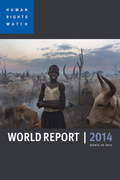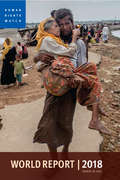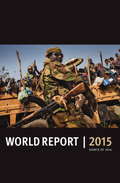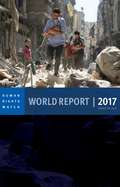Special Collections
Human Rights Collection
- Table View
- List View
Forced Apart
by Human Rights WatchThe 64-page report uses data from 1997 to 2007 from US Immigration and Customs Enforcement (ICE), to evaluate the effects of sweeping deportation laws passed in 1996. It shows that some of the most common crimes for which people were deported were relatively minor offenses, such as marijuana and cocaine possession or traffic offenses. Among legal immigrants who were deported, 77 percent had been convicted for such nonviolent crimes. Many had lived in the country for years and were forced apart from close family members.
World Report 2013
by Human Rights Watch and Kenneth Roth"The reports of the New York-based Human Rights Watch have become extremely important. . . . Cogent and eminently practical, these reports have gone far beyond an account of human rights abuses. . . ."--Ahmed Rashid in The New York Review of Books"An attempt to bring rationality where emotion tends to dominate."--Simon Jenkins, former editor of The Times (London) In the aftermath of 2011's Arab Spring uprisings, unexpected new challenges and imperatives of building rights-respecting democracies appeared in their wake. Human Rights Watch's 23rd annual World Report explores these new challenges and summarizes human rights conditions and practices in more than 90 countries and territories worldwide, reflecting extensive investigative work by Human Rights Watch staff. Human Rights Watch's World Report 2013 is the global rights watchdog's flagship annual review of global trends and news in human rights. An invaluable resource for journalists, diplomats, and citizens, it features not only incisive country surveys but also several hard-hitting essays highlighting key human rights issues, including:*An introduction by Human Rights Watch Executive Director Ken Roth on how the Arab Spring shows us that toppling dictators may yet prove to be easier than the tough, complicated process of building a rights-respecting democracy;*An essay on a Human Rights Council resolution on "traditional values" sponsored by Russia, and the implicit dangers this could mean for LGBT rights; *An essay on the failure of many global businesses to operate with sufficient regard to human rights, and of governments to oversee them--leading to abuses such as the use of forced labor on a Canadian construction site in Eritrea, or the gang rapes of women by security guards employed by an international mining giant in Papua New Guinea.World Report 2013 also features striking photo essays by award winning photographers.
Submission to the Committee on the Elimination of Racial Discrimination
by Human Rights Watchthis 48-page report, Human Rights Watch documents US noncompliance with ICERD in seven key areas. The treaty, ratified by the United States in 1994, requires member governments to take affirmative steps to eliminate discrimination on the basis of race, color, or national or ethnic origin in all areas of public life. The Human Rights Watch report was prepared for submission to the Committee on the Elimination of Racial Discrimination, an international body that monitors and reports on compliance with ICERD. The committee will examine US compliance with ICERD at a session in Geneva, Switzerland, on February 21-22, 2008.
Restrictions on AIDS Activists in China
by Human Rights WatchThis 57-page report based on on-the-ground interviews with Chinese AIDS activists, gay rights activists, activists working with drug users, and website managers shows that while senior officials have said they want to encourage China's emerging civil society, many AIDS activists face state harassment and bureaucratic restrictions. First-hand accounts provided to Human Rights Watch reveal that activists conducting AIDS information workshops or working with those at high risk of HIV have been harassed or detained, and that pornography laws are used to censor websites providing AIDS information to gay men and lesbians under pornography laws.
An Unbreakable Cycle:Drug Dependency Treatment, Mandatory Confinement, and HIV/AIDS in China’s Guangxi Province
by Human Rights WatchIn China, illicit drug use is an administrative offense and Chinese law dictates that drug users "must be rehabilitated." In reality, police raids on drug users often drive them underground, away from methadone clinics, needle exchange sites, and other proven HIV prevention services. And every year Chinese police send tens of thousands of drug users to mandatory drug treatment centers, often for years, without trial or due process. This report finds that most mandatory treatment centers, while ostensibly meant to provide drug treatment, do not actually offer forms of drug dependence treatment internationally recognized as effective. Mostly, drug users are forced to work or to spend their days in crowded cells little different from prisons.
No Easy Answers
by Human Rights WatchThis 146-page report is the first comprehensive study of US sex offender policies, their public safety impact, and the effect they have on former offenders and their families. During two years of investigation for this report, Human Rights Watch researchers conducted over 200 interviews with victims of sexual violence and their relatives, former offenders, law enforcement and government officials, treatment providers, researchers, and child safety advocates.
World Report 2018
by Human Rights Watch and Kenneth RothThe human rights records of more than ninety countries and territories are put into perspective in Human Rights Watch's signature yearly report. Reflecting extensive investigative work undertaken in 2016 by Human Rights Watch staff, in close partnership with domestic human rights activists, the annual World Report is an invaluable resource for journalists, diplomats, and citizens, and is a must-read for anyone interested in the fight to protect human rights in every corner of the globe.
World Report 2015
by Human Rights WatchThe human rights records of more than ninety countries and territories is put into perspective in Human Rights Watch's signature yearly report, which, in the 2014 volume, highlighted the armed conflict in Syria, international drug reform, drones and electronic mass surveillance, and more, and also featured photo essays of child marriage in South Sudan, the cost of the Sochi Winter Olympics in Russia, and religious fighting in Central African Republic. Reflecting extensive investigative work undertaken in 2014 by Human Rights Watch staff, in close partnership with domestic human rights activists, the annual World Report 2015 is an invaluable resource for journalists, diplomats, and citizens, and is a must-read for anyone interested in the fight to protect human rights in every corner of the globe.From the Trade Paperback edition.
Borderline Slavery
by Human Rights WatchWest African governments are failing to address a rampant traffic in child labor that could worsen with the region's growing AIDS crisis, Human Rights Watch charged in a new report released today. The 79-page report, "Borderline Slavery: Child Trafficking in Togo," highlights Togo as a case study of trafficking in the region. The report documents how children as young as three years old are exploited as domestic and agricultural workers in several countries.
Impairing Education
by Human Rights WatchIn this 70-page report, the ACLU and Human Rights Watch found that students with disabilities made up 18.8 percent of students who suffered corporal punishment at school during the 2006-2007 school year, although they constituted just 13.7 percent of the total nationwide student population. At least 41,972 students with disabilities were subjected to corporal punishment in US schools during that year. These numbers probably undercount the actual rate of physical discipline, since not all instances are reported or recorded.
World Report 2017
by Human Rights Watch and Kenneth RothThe human rights records of more than ninety countries and territories are put into perspective in Human Rights Watch's signature yearly report. Reflecting extensive investigative work undertaken in 2016 by Human Rights Watch staff, in close partnership with domestic human rights activists, the annual World Report is an invaluable resource for journalists, diplomats, and citizens, and is a must-read for anyone interested in the fight to protect human rights in every corner of the globe.From the Trade Paperback edition.




